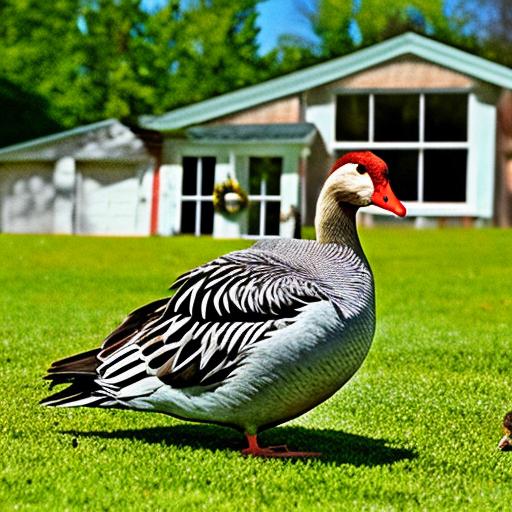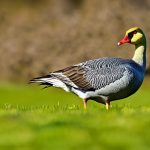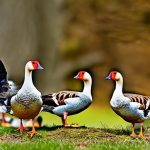Geese can be a common sight in residential areas, often causing problems for homeowners. From their droppings to their aggressive behavior, dealing with geese can be a nuisance. However, understanding their behavior is crucial in effectively keeping them off your property. By implementing the right strategies and taking necessary precautions, you can enjoy your yard without the hassle of geese.
Key Takeaways
- Geese can be a problem in residential areas, causing damage to property and posing health risks.
- Understanding the behavior of geese can help in finding effective ways to keep them off your yard.
- Risks of geese on your yard include property damage, noise, and potential health hazards from their droppings.
- Effective ways to keep geese off your property include natural deterrents, physical barriers, and regular maintenance.
- Working with your community and seeking professional help can also be effective in addressing persistent geese issues.
- Natural deterrents for geese include decoys, reflective tape, and landscaping changes.
- Installing physical barriers such as fences, netting, and spikes can also keep geese out.
- Regular maintenance such as cleaning up droppings and removing food sources can prevent geese from returning.
- Working with your community to address the geese problem can involve implementing community-wide deterrents and regulations.
- By taking these steps, you can enjoy your yard without the hassle of geese.
The problem of geese in residential areas
Geese are increasingly prevalent in residential areas, and their presence can cause numerous issues for homeowners. They are attracted to these areas due to the abundance of food sources, such as grass and water bodies. Additionally, residential areas often provide a safe haven for geese, as they are protected from predators and have access to open spaces for nesting.
Understanding the behavior of geese
To effectively keep geese off your property, it is important to understand their behavior. Geese are known for their nesting habits and feeding patterns. They typically build nests near water bodies and lay eggs during the spring months. Geese are also herbivores and feed on grass, aquatic plants, and grains.
Geese can become aggressive towards humans, especially during their nesting season. They may perceive humans as a threat to their nests and young goslings. It is important to keep a safe distance from nesting geese to avoid any potential confrontations.
The risks of geese on your yard
Having geese on your yard can pose several risks. Firstly, their droppings can be unsightly and difficult to clean up. Geese droppings can also damage lawns and gardens by killing grass and plants due to their high nitrogen content.
Furthermore, geese can be carriers of diseases such as avian influenza and salmonella, which can pose health risks to humans and pets. It is important to take necessary precautions when dealing with geese to minimize these risks.
Effective ways to keep geese off your property
There are several effective ways to keep geese off your property. One method is using noise deterrents, such as ultrasonic devices or motion-activated sprinklers. These devices emit sounds or bursts of water that startle the geese and discourage them from staying in the area.
Visual deterrents can also be effective in deterring geese. These include reflective tape, scarecrows, or decoys of natural predators like owls or coyotes. The movement and presence of these visual deterrents can make geese feel unsafe and encourage them to find another location.
Natural deterrents for geese

In addition to noise and visual deterrents, there are natural methods to discourage geese from your property. Planting certain types of vegetation can make your yard less attractive to geese. They prefer open spaces with short grass, so planting taller grasses or shrubs can make your yard less appealing to them.
Using decoys of other waterfowl species can also deter geese. Geese are social animals and prefer to be in groups. By placing decoys of other waterfowl species, geese may be less likely to settle in your yard.
Installing physical barriers to keep geese out
Physical barriers can be an effective way to keep geese out of your property. Fences or netting can be installed around areas where geese are likely to gather, such as ponds or gardens. These barriers prevent geese from accessing these areas and discourage them from staying on your property.
The importance of regular maintenance to prevent geese from returning
Regular maintenance is crucial in preventing geese from returning to your property. It is important to clean up any food sources that may attract geese, such as fallen fruits or bird feeders. Removing nests and eggs during the nesting season can also discourage geese from returning.
Working with your community to address the geese problem
Addressing the geese problem in your community requires collaboration with your neighbors and local authorities. Contacting local authorities, such as animal control or wildlife agencies, can help in addressing the issue. Educating your neighbors about the risks and effective deterrent methods can also encourage them to take action.
Seeking professional help for persistent geese issues
If you are facing persistent geese issues despite your efforts, it may be necessary to seek professional help. Wildlife control companies specialize in dealing with geese and can provide effective solutions tailored to your specific situation. They have the expertise and resources to safely and humanely remove geese from your property.
Enjoying your yard without the hassle of geese
By understanding the behavior of geese and implementing effective deterrent methods, you can enjoy your yard without the hassle of geese. Taking necessary precautions, such as regular maintenance and working with your community, can help in keeping geese off your property. With these strategies in place, you can create a peaceful and enjoyable outdoor space for yourself and your family.
If you’re looking for effective ways to keep geese off your yard, you may also be interested in learning about the benefits of raising quails. These small birds not only make great pets but can also help control pests in your garden. Poultry Wizard has a helpful article on what vegetables quails eat, which can provide valuable insights into their dietary needs and preferences. By incorporating certain vegetables into their diet, you can ensure that your quails stay healthy and happy while keeping unwanted geese at bay. To learn more about this topic, check out the article here.
FAQs
What are some effective ways to keep geese off my yard?
There are several effective ways to keep geese off your yard, including using decoys, installing fencing, using repellents, and creating physical barriers.
What are some natural repellents that can be used to keep geese away?
Some natural repellents that can be used to keep geese away include planting certain types of vegetation, using noise deterrents, and using visual deterrents such as reflective tape or balloons.
What are some common mistakes people make when trying to keep geese off their yard?
Some common mistakes people make when trying to keep geese off their yard include using ineffective or outdated methods, not being consistent with their efforts, and not addressing the root cause of the problem.
What are some long-term solutions for keeping geese off my yard?
Some long-term solutions for keeping geese off your yard include creating a habitat that is less attractive to geese, such as removing sources of food and water, and using landscaping techniques that discourage geese from landing on your property.
Is it legal to harm or kill geese to keep them off my yard?
No, it is not legal to harm or kill geese to keep them off your yard. Geese are protected under federal law, and there are strict regulations in place to ensure their safety and well-being.
Meet Walter, the feathered-friend fanatic of Florida! Nestled in the sunshine state, Walter struts through life with his feathered companions, clucking his way to happiness. With a coop that’s fancier than a five-star hotel, he’s the Don Juan of the chicken world. When he’s not teaching his hens to do the cha-cha, you’ll find him in a heated debate with his prized rooster, Sir Clucks-a-Lot. Walter’s poultry passion is no yolk; he’s the sunny-side-up guy you never knew you needed in your flock of friends!







